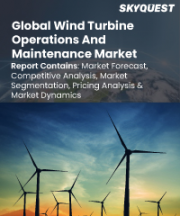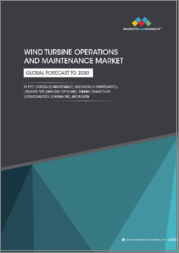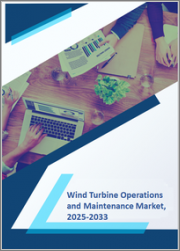
|
시장보고서
상품코드
1798071
풍력 터빈 운영 및 유지보수 시장 예측 : 유형별, 구성요소별, 전개별, 정비유형별, 서비스 제공업체별, 용도별, 지역별 분석(-2032년)Wind Turbine Operations and Maintenance Market Forecasts to 2032 - Global Analysis By Service Type, Component, Deployment, Maintenance Type, Service Provider, Application and By Geography |
||||||
Stratistics MRC에 따르면 세계의 풍력 터빈 운영 및 유지보수 시장은 2025년에 194억 달러, 예측 기간 중 CAGR은 7%를 나타내고, 2032년에는 311억 달러에 이를 전망입니다.
풍력 터빈 운영 및 유지보수란 풍력 터빈이 운전 수명을 통해 기능적, 효율적, 안전하게 유지하기 위해 수행되는 다양한 활동을 말합니다. 이러한 활동에는 점검, 수리, 부품 교체, 성능 모니터링 등이 포함됩니다. 정비에는 예방적, 예지적 또는 교정적인 특성이 있습니다. 또한 육상과 해상 풍력 발전소와 관련되어 있습니다.
엔지니어링 디지털 아트 학부(EDA)에 따르면 영국에서는 2025년까지 약 300기, 2030년까지 약 1600기의 초기형 해상 풍력 터빈의 오버홀 또는 교환이 필요하다고 합니다.
풍력발전설비 증가
풍력발전설비 증가로 전문적인 운용 및 정비(O&M) 서비스 수요가 증가하고 있습니다. 정부와 민간기업이 신재생에너지 목표를 달성하기 위해 풍력발전의 도입을 가속화함에 따라 터빈 설치 대수가 확대되고 있습니다. 이 확장을 위해서는 최적의 성능을 보장하고 가동 중지 시간을 줄이고 터빈 수명을 연장하는 일관된 유지 관리가 필요합니다. 해상풍력발전소의 급증은 고도의 O&M 솔루션에 대한 요구를 더욱 강화하고, 예지보전, 예방보전, 시정보전의 각 분야의 성장을 세계적으로 촉진하고 있습니다.
서비스 액세스를 제한하는 악천후
서비스 접근을 제한하는 가혹한 날씨는 풍력 터빈의 정비에 심각한 운영상의 어려움을 초래합니다. 해외 및 육상 원격지에서는 강풍, 폭설, 폭풍우가 발생하며 기술자의 이동이 제한되어 수리 일정이 지연됩니다. 이러한 상황은 정기 점검을 방해할 뿐만 아니라 정비 근로자의 안전 위험도 높일 수 있습니다. 게다가 이러한 기후로 운영하기 위해서는 특수한 설비가 필요하기 때문에 운용 경비가 증가하고, 결국 서비스 효율에 영향을 주고, 날씨에 좌우되기 쉬운 지역에서 시장의 확장성이 제한됩니다.
예측 보전 솔루션의 성장
예지 보전 솔루션의 성장은 시장에 유망한 전망을 제공합니다. AI, IoT 및 고급 분석을 활용하여 운영자는 터빈의 건전성을 실시간으로 모니터링하고 고장을 사전에 예측할 수 있습니다. 이 데이터 중심의 접근 방식은 가동 중지 시간을 최소화하고 수리 비용을 줄이고 부품 수명을 연장합니다. 신재생에너지·프로젝트에서는 비용의 최적화가 중시되게 되어 있어, 예지보전의 채택이 가속해, 육상 및 해상 양쪽의 풍력발전소의 서비스 제공업체나 기술 인티그레이터에 새로운 수익원이 태어날 가능성이 높습니다.
대체 재생에너지와의 경쟁
대체 재생에너지와의 경쟁은 풍력 터빈 O&M 서비스의 성장 궤도에 도전을 던지고 있습니다. 특히 태양광 발전은 정비의 필요성이 낮고 운영의 복잡성도 낮기 때문에 특정 지역에서는 투자 이동을 유도합니다. 파력 발전과 조력 발전과 같은 새로운 재생에너지 기술도 인기를 끌고 있으며, 풍력 발전 프로젝트에서 자금이 유출될 가능성이 있습니다. 이러한 신재생에너지 및 포트폴리오의 다양화는 풍력발전소의 확장 속도를 낮추고 관련 서비스 및 서비스 수요에 간접적으로 영향을 미칠 수 있습니다.
COVID-19의 영향 :
COVID-19의 팬데믹은 처음에는 여행 제한, 노동력 부족, 공급망 지연으로 인해 풍력 터빈의 O&M 활동에 지장을 주었습니다. 현장에서의 정비 작업은 스케줄의 후퇴에 직면하여 수리의 연기와 다운타임의 연장으로 이어졌습니다. 그러나 이 위기는 물리적 개입을 줄이기 위해 원격 모니터링과 디지털 진단의 채택을 가속화했습니다. 시장이 적응함에 따라 운영자는 자동화 및 예측 도구를 통합한 보다 탄력적인 서비스 모델을 도입했습니다. 이는 COVID-19 이후의 운영 효율성에 긍정적인 영향을 미칩니다.
예측기간 중 정기/예방정비분야가 최대가 될 전망
정기/예방 정비 분야는 예기치 않은 고장을 줄이고 터빈을 최적의 능력으로 운전하는 역할에 추진되어 예측 기간 중 최대 시장 점유율을 차지할 것으로 예측됩니다. 정기점검, 윤활, 부품교환을 실시함으로써 사업자는 자산의 수명을 연장하고 비용이 많이 드는 다운타임을 피할 수 있습니다. 세계의 풍력발전 사업자, 특히 해상 프로젝트에서 계획된 정비 프로그램의 채택이 증가하고 있는 것은 성능과 수익성을 유지하기 위한 예방 조치의 전략적 중요성을 강조하고 있습니다.
예측 기간 동안 블레이드 분야의 CAGR이 가장 높아질 전망
예측 기간 동안 터빈 효율에서 블레이드의 중요한 역할과 날씨, 파편 및 침식으로 인한 마모에 대한 취약성의 영향을 받아 블레이드 부문이 가장 높은 성장률을 보일 것으로 예측됩니다. 공기 역학 성능을 유지하고 구조적 결함을 방지하려면 자주 점검, 청소 및 수리가 필수적입니다. 무인 항공기와 고급 복합재료를 포함한 블레이드 수리 기술의 혁신은 서비스 수요를 이끌고 있습니다. 이 추세는 블레이드 손상 위험이 높은 해상 풍력 발전소에서 특히 두드러집니다.
최대 점유율을 가진 지역
예측 기간 동안 아시아태평양은 중국, 인도 및 호주에서 대규모 풍력 발전 설비에 힘입어 최대 시장 점유율을 차지할 것으로 예측됩니다. 신재생에너지를 지원하는 정부 정책은 해상풍력 프로젝트에 대한 대규모 투자와 함께 정비가 필요한 설치 기반을 확대하고 있습니다. 게다가 에너지 안보와 탈탄소화를 중시하는 이 지역은 터빈의 라이프사이클 관리의 강화를 촉구하고 있으며, 그 결과 다양한 지역에서 예방 및 교정 정비 서비스의 일관된 수요가 증가하고 있습니다.
CAGR이 가장 높은 지역 :
예측 기간 동안 북미가 가장 높은 CAGR을 나타낼 것으로 예측되며, 이는 미국과 캐나다의 해상 풍력 발전 구상 확대에 견인되고 있습니다. 청정 에너지 도입에 대한 연방 및 주 수준의 인센티브는 풍력 발전소의 전개를 가속화하고 O&M 요건을 직접적으로 강화하고 있습니다. 이 지역에서는 디지털, 정비, 도구 및 예측 분석의 진보가 빠르게 확산되고 있습니다. 게다가 노후화된 터빈의 재동력화에 대한 투자 증가는 앞으로 수년간 O&M 서비스의 성장에 크게 기여할 것으로 예측됩니다.
무료 맞춤형 서비스
이 보고서를 구독하는 고객은 다음 무료 맞춤설정 옵션 중 하나를 사용할 수 있습니다.
- 기업 프로파일
- 추가 기업의 종합적 프로파일링(3개사까지)
- 주요 기업의 SWOT 분석(3개사까지)
- 지역 구분
- 고객의 관심에 응한 주요국 시장 추정, 예측 및 CAGR(주 : 타당성 확인에 따름)
- 경쟁 벤치마킹
- 제품 포트폴리오, 지리적 존재, 전략적 제휴에 기반한 주요 기업 벤치마킹
목차
제1장 주요 요약
제2장 서론
- 개요
- 이해관계자
- 분석 범위
- 분석 방법
- 데이터 마이닝
- 데이터 분석
- 데이터 검증
- 분석 접근
- 분석 자료
- 1차 조사 자료
- 2차 조사 정보원
- 전제조건
제3장 시장 동향 분석
- 성장 촉진요인
- 억제요인
- 시장 기회
- 위협
- 용도 분석
- 신흥 시장
- 신형 코로나 바이러스 감염(COVID-19)의 영향
제4장 Porter's Five Forces 분석
- 공급자의 협상력
- 바이어의 협상력
- 대체 제품의 위협
- 신규 진출기업의 위협
- 기업간 경쟁
제5장 세계의 풍력 터빈 운영 및 유지보수 시장 : 서비스유형별
- 정기/예방 유지보수
- 교정 정비/비계획 정비 유지보수
- 상태 감시 서비스
- 자산 관리 서비스
- 개조 및 업그레이드
- 블레이드 검사 및 수리 서비스
- 기타 서비스의 유형
제6장 세계의 풍력 터빈 운영 및 유지보수 시장 : 구성요소별
- 터빈
- 블레이드
- 타워
- 발전기
- 기어박스
- 전기 시스템 및 제어 장치
- 기타 구성요소
제7장 세계의 풍력 터빈 운영 및 유지보수 시장 : 전개별
- 육상풍력발전소
- 해상풍력발전소
제8장 세계의 풍력 터빈 운영 및 유지보수 시장 : 정비유형별
- 사내 정비
- 외주/타사 정비
제9장 세계의 풍력 터빈 운영 및 유지보수 시장 : 서비스 제공업체별
- OEM 서비스 제공업체
- 독립 서비스 제공업체(ISP)
- 사내 O&M팀
제10장 세계의 풍력 터빈 운영 및 유지보수 시장 : 용도별
- 유틸리티 스케일 프로젝트
- 산업/상업용도
- 소규모/커뮤니티 프로젝트
제11장 세계의 풍력 터빈 운영 및 유지보수 시장 : 지역별
- 북미
- 미국
- 캐나다
- 멕시코
- 유럽
- 독일
- 영국
- 이탈리아
- 프랑스
- 스페인
- 기타 유럽
- 아시아태평양
- 일본
- 중국
- 인도
- 호주
- 뉴질랜드
- 한국
- 기타 아시아태평양
- 남미
- 아르헨티나
- 브라질
- 칠레
- 기타 남미
- 중동 및 아프리카
- 사우디아라비아
- 아랍에미리트(UAE)
- 카타르
- 남아프리카
- 기타 중동 및 아프리카
제12장 주요 동향
- 계약, 사업 제휴 및 협력, 합작 사업
- 기업 합병 및 인수(M&A)
- 신제품 발매
- 사업 확장
- 기타 주요 전략
제13장 기업 프로파일링
- GE
- Siemens Gamesa
- Vestas
- NORDEX SE
- Deutsche Windtechnik
- Suzlon Energy Limited
- Enercon GmbH
- B9 Energy Group
- Fred. Olsen Windcarrier
- GoldWind
- REETEC
- UpWind Solutions
- EDF Renewables
- Orsted
- Ingeteam
- E.ON Climate & Renewables
- MHI Vestas Offshore Wind
According to Stratistics MRC, the Global Wind Turbine Operations and Maintenance Market is accounted for $19.4 billion in 2025 and is expected to reach $31.1 billion by 2032 growing at a CAGR of 7% during the forecast period. Wind turbine operations and maintenance refers to the range of activities performed to ensure wind turbines remain functional, efficient, and safe throughout their operational lifespan. These activities include inspections, repairs, component replacements, and performance monitoring. Maintenance can be preventive, predictive, or corrective in nature. It involves both onshore and offshore wind farms.
According to the School of Engineering and Digital Arts (EDA), the United Kingdom must either overhaul or replace approximately 300 and 1,600 early-model offshore wind turbines by 2025 and 2030, respectively.
Market Dynamics:
Driver:
Increasing number of wind installations
Increasing number of wind installations is boosting demand for specialized operations and maintenance (O&M) services. As governments and private players accelerate wind power deployment to meet renewable energy targets, the installed base of turbines is expanding. This expansion necessitates consistent upkeep to ensure optimal performance, reduce downtime, and extend turbine lifespan. The surge in offshore wind farms further intensifies the requirement for advanced O&M solutions, driving growth across predictive, preventive, and corrective maintenance segments globally.
Restraint:
Harsh weather limiting service access
Harsh weather limiting service access poses significant operational challenges for wind turbine maintenance. Offshore and remote onshore sites often face extreme winds, heavy snowfall, or storms that restrict technician mobility and delay repair schedules. These conditions not only hinder routine inspections but also raise safety risks for maintenance crews. Additionally, the need for specialized equipment to operate in such climates increases operational expenses, ultimately impacting service efficiency and limiting market scalability in weather-prone geographies.
Opportunity:
Growth in predictive maintenance solutions
Growth in predictive maintenance solutions offers promising prospects for the market. Leveraging AI, IoT, and advanced analytics, operators can monitor turbine health in real time, anticipating failures before they occur. This data-driven approach minimizes downtime, reduces repair costs, and extends component lifespan. With increasing emphasis on cost optimization in renewable energy projects, the adoption of predictive maintenance is likely to accelerate, creating new revenue streams for service providers and technology integrators across both onshore and offshore wind farms.
Threat:
Competition from alternative renewable sources
Competition from alternative renewable sources challenges the growth trajectory of wind turbine O&M services. Solar power, in particular, requires less maintenance and has lower operational complexity, attracting investment shifts in certain regions. Emerging renewable technologies like wave and tidal energy are also gaining traction, potentially diverting funds away from wind projects. This diversification in renewable portfolios may reduce the expansion pace of wind farms, indirectly affecting demand for associated maintenance services.
Covid-19 Impact:
The COVID-19 pandemic initially disrupted wind turbine O&M activities due to travel restrictions, labor shortages, and supply chain delays. On-site maintenance work faced scheduling setbacks, leading to postponed repairs and extended downtimes. However, the crisis accelerated the adoption of remote monitoring and digital diagnostics to reduce physical interventions. As the market adapted, operators implemented more resilient service models, incorporating automation and predictive tools, which are likely to have lasting positive impacts on operational efficiency post-pandemic.
The scheduled/preventive maintenance segment is expected to be the largest during the forecast period
The scheduled/preventive maintenance segment is expected to account for the largest market share during the forecast period, propelled by its role in reducing unexpected breakdowns and ensuring turbines operate at optimal capacity. By performing routine inspections, lubrication, and part replacements, operators can extend asset life and avoid costly downtime. Growing adoption of structured maintenance programs by wind farm operators worldwide, particularly in offshore projects, underscores the strategic importance of preventive measures in sustaining performance and profitability.
The blades segment is expected to have the highest CAGR during the forecast period
Over the forecast period, the blades segment is predicted to witness the highest growth rate, influenced by their critical role in turbine efficiency and vulnerability to wear from weather, debris, and erosion. Frequent inspections, cleaning, and repairs are essential to maintain aerodynamic performance and prevent structural failures. Innovations in blade repair technologies, including drones and advanced composite materials, are driving service demand. This trend is particularly strong in offshore wind farms, where blade damage risks are elevated.
Region with largest share:
During the forecast period, the Asia Pacific region is expected to hold the largest market share, fuelled by massive wind energy installations in China, India, and Australia. Government policies supporting renewable energy, coupled with significant investments in offshore wind projects, are expanding the installed base requiring maintenance. Additionally, the region's focus on energy security and decarbonization is prompting increased lifecycle management of turbines, thereby driving consistent demand for both preventive and corrective maintenance services across diverse geographies.
Region with highest CAGR:
Over the forecast period, the North America region is anticipated to exhibit the highest CAGR, driven by expanding offshore wind initiatives in the United States and Canada. Federal and state-level incentives for clean energy adoption are accelerating wind farm deployments, directly boosting O&M requirements. Advancements in digital maintenance tools and predictive analytics are gaining rapid traction in the region. Moreover, increasing investments in repowering aging turbines are expected to significantly contribute to O&M service growth in the coming years.
Key players in the market
Some of the key players in Wind Turbine Operations and Maintenance Market include GE, Siemens Gamesa, Vestas, NORDEX SE, Deutsche Windtechnik, Suzlon Energy Limited, Enercon GmbH, B9 Energy Group, Fred. Olsen Windcarrier, GoldWind, REETEC, UpWind Solutions, EDF Renewables, Orsted, Ingeteam, E.ON Climate & Renewables, and MHI Vestas Offshore Wind.
Key Developments:
June 2025: Nordex SE unveiled a modular maintenance training program for wind turbine technicians, focusing on advanced repair techniques for next-generation turbines, to address the global shortage of skilled labor.
May 2025: Orsted rolled out a specialized offshore logistics platform, incorporating autonomous vessels for maintenance operations, aimed at reducing operational costs by 15% for its European wind farms.
April 2025: GE Vernova announced the expansion of its remote diagnostic services for wind farms in North America, integrating machine learning to predict component failures with 95% accuracy.
Service Types Covered:
- Scheduled/Preventive Maintenance
- Corrective/Unscheduled Maintenance
- Condition Monitoring Services
- Asset Management Services
- Retrofits & Upgrades
- Blade Inspection & Repair Services
- Other Service Types
Components Covered:
- Turbine
- Blades
- Tower
- Generator
- Gearbox
- Electrical Systems & Control Units
- Other Components
Deployments Covered:
- Onshore Wind Farms
- Offshore Wind Farms
Maintenance Types Covered:
- In-House Maintenance
- Outsourced/Third-Party Maintenance
Service Providers Covered:
- OEM Service Providers
- Independent Service Providers (ISPs)
- In-House O&M Teams
Applications Covered:
- Utility-Scale Projects
- Industrial/Commercial Applications
- Small-Scale/Community Projects
Regions Covered:
- North America
- US
- Canada
- Mexico
- Europe
- Germany
- UK
- Italy
- France
- Spain
- Rest of Europe
- Asia Pacific
- Japan
- China
- India
- Australia
- New Zealand
- South Korea
- Rest of Asia Pacific
- South America
- Argentina
- Brazil
- Chile
- Rest of South America
- Middle East & Africa
- Saudi Arabia
- UAE
- Qatar
- South Africa
- Rest of Middle East & Africa
What our report offers:
- Market share assessments for the regional and country-level segments
- Strategic recommendations for the new entrants
- Covers Market data for the years 2024, 2025, 2026, 2028, and 2032
- Market Trends (Drivers, Constraints, Opportunities, Threats, Challenges, Investment Opportunities, and recommendations)
- Strategic recommendations in key business segments based on the market estimations
- Competitive landscaping mapping the key common trends
- Company profiling with detailed strategies, financials, and recent developments
- Supply chain trends mapping the latest technological advancements
Free Customization Offerings:
All the customers of this report will be entitled to receive one of the following free customization options:
- Company Profiling
- Comprehensive profiling of additional market players (up to 3)
- SWOT Analysis of key players (up to 3)
- Regional Segmentation
- Market estimations, Forecasts and CAGR of any prominent country as per the client's interest (Note: Depends on feasibility check)
- Competitive Benchmarking
- Benchmarking of key players based on product portfolio, geographical presence, and strategic alliances
Table of Contents
1 Executive Summary
2 Preface
- 2.1 Abstract
- 2.2 Stake Holders
- 2.3 Research Scope
- 2.4 Research Methodology
- 2.4.1 Data Mining
- 2.4.2 Data Analysis
- 2.4.3 Data Validation
- 2.4.4 Research Approach
- 2.5 Research Sources
- 2.5.1 Primary Research Sources
- 2.5.2 Secondary Research Sources
- 2.5.3 Assumptions
3 Market Trend Analysis
- 3.1 Introduction
- 3.2 Drivers
- 3.3 Restraints
- 3.4 Opportunities
- 3.5 Threats
- 3.6 Application Analysis
- 3.7 Emerging Markets
- 3.8 Impact of Covid-19
4 Porters Five Force Analysis
- 4.1 Bargaining power of suppliers
- 4.2 Bargaining power of buyers
- 4.3 Threat of substitutes
- 4.4 Threat of new entrants
- 4.5 Competitive rivalry
5 Global Wind Turbine Operations and Maintenance Market, By Service Type
- 5.1 Introduction
- 5.2 Scheduled/Preventive Maintenance
- 5.3 Corrective/Unscheduled Maintenance
- 5.4 Condition Monitoring Services
- 5.5 Asset Management Services
- 5.6 Retrofits & Upgrades
- 5.7 Blade Inspection & Repair Services
- 5.8 Other Service Types
6 Global Wind Turbine Operations and Maintenance Market, By Component
- 6.1 Introduction
- 6.2 Turbine
- 6.3 Blades
- 6.4 Tower
- 6.5 Generator
- 6.6 Gearbox
- 6.7 Electrical Systems & Control Units
- 6.8 Other Components
7 Global Wind Turbine Operations and Maintenance Market, By Deployment
- 7.1 Introduction
- 7.2 Onshore Wind Farms
- 7.3 Offshore Wind Farms
8 Global Wind Turbine Operations and Maintenance Market, By Maintenance Type
- 8.1 Introduction
- 8.2 In-House Maintenance
- 8.3 Outsourced/Third-Party Maintenance
9 Global Wind Turbine Operations and Maintenance Market, By Service Provider
- 9.1 Introduction
- 9.2 OEM Service Providers
- 9.3 Independent Service Providers (ISPs)
- 9.4 In-House O&M Teams
10 Global Wind Turbine Operations and Maintenance Market, By Application
- 10.1 Introduction
- 10.2 Utility-Scale Projects
- 10.3 Industrial/Commercial Applications
- 10.4 Small-Scale/Community Projects
11 Global Wind Turbine Operations and Maintenance Market, By Geography
- 11.1 Introduction
- 11.2 North America
- 11.2.1 US
- 11.2.2 Canada
- 11.2.3 Mexico
- 11.3 Europe
- 11.3.1 Germany
- 11.3.2 UK
- 11.3.3 Italy
- 11.3.4 France
- 11.3.5 Spain
- 11.3.6 Rest of Europe
- 11.4 Asia Pacific
- 11.4.1 Japan
- 11.4.2 China
- 11.4.3 India
- 11.4.4 Australia
- 11.4.5 New Zealand
- 11.4.6 South Korea
- 11.4.7 Rest of Asia Pacific
- 11.5 South America
- 11.5.1 Argentina
- 11.5.2 Brazil
- 11.5.3 Chile
- 11.5.4 Rest of South America
- 11.6 Middle East & Africa
- 11.6.1 Saudi Arabia
- 11.6.2 UAE
- 11.6.3 Qatar
- 11.6.4 South Africa
- 11.6.5 Rest of Middle East & Africa
12 Key Developments
- 12.1 Agreements, Partnerships, Collaborations and Joint Ventures
- 12.2 Acquisitions & Mergers
- 12.3 New Product Launch
- 12.4 Expansions
- 12.5 Other Key Strategies
13 Company Profiling
- 13.1 GE
- 13.2 Siemens Gamesa
- 13.3 Vestas
- 13.4 NORDEX SE
- 13.5 Deutsche Windtechnik
- 13.6 Suzlon Energy Limited
- 13.7 Enercon GmbH
- 13.8 B9 Energy Group
- 13.9 Fred. Olsen Windcarrier
- 13.10 GoldWind
- 13.11 REETEC
- 13.12 UpWind Solutions
- 13.13 EDF Renewables
- 13.14 Orsted
- 13.15 Ingeteam
- 13.16 E.ON Climate & Renewables
- 13.17 MHI Vestas Offshore Wind



















